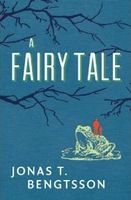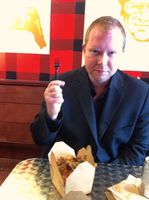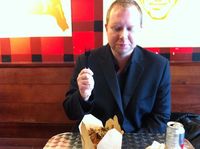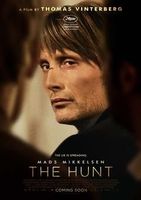Words & Curds: Jonas T. Bengtsson, Author of a Fairy Tale
By Evan Munday
On April 16, I met with Danish author Jonas T. Bengtsson, whose newest English translation, A Fairy Tale, has just been published by House of Anansi. He was in town for the IFOA Weekly readings. We visited Smoke's Poutinerie, and upon my suggestion, we both ordered the 'Hogtown' variety (topped with mushrooms, sautéed onions, bacon, and pork sausage). We talked about the fears of fatherhood, murderous furniture-makers and Lego. I finished my poutine. Bengtsson did not. Though it may seem unbelievable, the interview has been edited for length.
About A Fairy Tale: (adapted from the House of Anansi site) From one of Denmark’s rising stars, a powerful and profound novel about a young boy and his father who live at the margins of society. Following the assassination of Swedish Prime Minister Olof Palme, the boy and his father go on the move, the father taking a series of odd jobs, from making antique furniture, to landscaping, to working as a bouncer at a strip club. By day he home-schools his young son. At night he weaves a fairy tale about a prince and a king who are on a mission to kill the wicked White Queen, while running from the White Men who hide in plain sight. Until their adventure takes an unpredictable turn.
JONAS: This looks like the perfect hangover food.
EVAN: It is! This area is close to a lot of nightclubs. This place stays open until three and people come by after the clubs close.
JONAS: What are these?
EVAN: Those are the sausages. There's bacon and sausage in it. Double-pork.
JONAS: (Laughter.)
EVAN: I've read some of the interviews you've given, and I thought it was interesting when you said what inspired you to write this book was your young son. I think a lot of authors – when they have a young child – would be inspired to try writing kids' books or something like that. But instead, your inspiration came from a darker place in that you realized that your son believed you and trusted things you told him.
JONAS: That was a large realization. That was kind of scary at the same time. Sometimes if you get scared, then that's the place you should go as a writer, I think.
EVAN: So, for you, things that kind of scare you are what lead to a book?
Your CanLit News
Subscribe to Open Book’s newsletter to get local book events, literary content, writing tips, and more in your inbox
JONAS: Yes, also the outsider perspective, which is in all of my books. Because I never really found that I fit in. But, you know, I was in my mid-thirties when I started writing and nothing is more boring than a guy in his mid-thirties writing about himself not fitting in.
EVAN: I guess that's a pretty common trope. Along the lines of that outsider perspective, it's very interesting that his father-son duo is living on the fringes of society. They're kind of surviving through various means, working jobs where the dad gets paid under the table, that kind of thing. There's a lot of … convincing people to give them things for free. Is this something that you've done or experienced yourself?
JONAS: I think I'm too much of an introvert to live like that. It's more like a fascination with the type of character who could do that. Who would be capable of that. The fascination of the guy who will say, 'There's a train; let's get on that train. Wind up at the final station and see if we can make a life for ourselves there.' And see if we can't make people trust us – talk people into trusting us – enough to get a place to stay for the night. That interested me, as well the idea that you have these books and films about people who leave society, going out into the wild. I was fascinated by the idea that maybe you could do that in a city. Like, leaving society but not leaving the city. Living off this society as you would the forests. Outside of society, but still in a major city.
EVAN: That's interesting. It definitely has that feel … like they're living off the land, even though 'the land' is a very urban environment. I thought … I'll let you finish your cheese – I thought the depiction of the various odd jobs that the father did was really vivid. In particular, his making furniture look antique. Are these things you'd done yourself? Or did you speak to people who did this type of work?
JONAS: My father, when he was young, he rented a room in an apartment where the landlord living there did that stuff. He sold unoriginal antique furniture. He turned things into antiques. So I got the idea from there. Later on, I think he was convicted for murder.
EVAN: That same guy?
JONAS: Yeah.
EVAN: Unrelated to his furniture-making business.
JONAS: Unrelated, yeah.
EVAN: While he was still renting a place to your father?
JONAS: Later.
EVAN: The father-son relationship is absolutely central to this novel. Were there any other father-son relationships – either in your own life or in works of fiction – that inspired you? I was reading it and I felt a lot of The Road by Cormac McCarthy was in there.
JONAS: Fortunately, I didn't read it until after I'd written my book. People were telling me – I was in the middle of it – and I said, 'I'm definitely not going to read it now.'
But I got divorced while writing this. So, being afraid of not being able to keep or have my son when I got divorced, that kind of influenced the writing. But I remember the books, the two stories that I thought of: The Tin Drum – that kind of fascinated me a lot – and Pelle the Conqueror.
EVAN: How are you enjoying the poutine so far?
JONAS: Hm. (Bemused sounds.)
EVAN: Is there a Danish equivalent? Or Danish hangover food that is popular?
JONAS: They have something that's slightly similar to this, but actually not in Copenhagen. You have to leave Copenhagen to find this other thing with meatballs [Frikadeller] and French fries.
EVAN: So, it's like this but there are meatballs on top of French fries?
JONAS: Yes. But I have never tried it.
EVAN: That's amazing. That's funny, because this is not – we're in Toronto now, but it's a relatively recent import to Toronto. It's a French-Canadian food. It was Quebec where this started and it's sort of been imported here. I think in a lot of wintry climates, that kind of hangover food comes from areas that are more remote, where people are logging and things like that. Fuel for that kind of work. Was there anything behind the decision to leave the father and son nameless?
JONAS: I like to play with names, and I hate to come up with names, that's another thing. I hate coming up with names and I like to play with them.
EVAN: (Laughter.)
JONAS: It's too easy to identify them as someone who is not yourself when you have a name on a character. With these two characters, it was a decision because for a small boy, it's just – that is his father.
EVAN: Yeah, and lot of times you don't even think of your dad's first name until you're older.
JONAS: And for the son, he has different names, so why stick with one?
EVAN: That's true. You play with it a lot, especially near the end when he takes a Turkish name and his friend doesn't believe he's actually Turkish. And I thought the fairy tale structure was interesting, too – the fairy tale the father continues to tell the son that's almost a parable for the way he sees the world. What led you to the fairy structure in this book?
JONAS: My last two books used the structure of the Greek tragedy. And I was very fascinated by – Denmark is a pretty nice country. Very middle-class. So a lot of stories have a tendency not to be that grand or that much bigger story. So, I tried to have a character that was larger than life, that was big, and I wanted to tell big stories. That's what started me using the structure of Greek tragedy.
With this one, I wanted to be much more … circular.
EVAN: If it's not too personal a question, do you tell your son stories or read to him?
JONAS: I do. Not that often fairy tales. Sometimes, actually. But real fairy tales are pretty hardcore, you know? I've been very inspired by the Slav tradition of fairy tales. And those are always very bloody.
EVAN: The book begins with the assassination of Olof Palme. Was that sort of – almost – Denmark's 'JFK moment'?
JONAS: That's a very apt comparison. Because we never thought something like that could happen in Scandinavia. And a lot of people really liked him. So, it came as a shock to us.
EVAN: Almost like a national loss of innocence?
JONAS: Not so much like lose your innocence. But, like, trust in the system. Definitely.
EVAN: And do you remember – you were alive in 1986, right? – do you remember anything about it at the time?
JONAS: I remember my mother crying, and I remember asking her if she knew him. And, of course, she didn't.
EVAN: The son is always drawing at the beginning of the novel. Always drawing things. And then, as he gets older, even when he's not drawing, he kind of talks about 'drawing things in his mind.' And then later, he has work featured in a gallery. Have you ever tried illustration before you started writing?
JONAS: Not really. For me, it's more when I write, I'm very visual. So the idea – I have no craft, no technique. I can't make a drawing. But for me the idea of creating images is not that far off. And it's so bad to read about somebody who writes, I think. I think we create art to understand our lives. To give it context. And I wanted the son to do this. The recreating everything through art. And by art, being able to understand it. Maybe not understand it, but chew it. Digest it.
EVAN: You were saying earlier that a lot of times you write to digest things. And you've said in other interviews that a lot of characters are sort of like extreme versions of yourself. In that case, do you see yourself more as the father or son in A Fairy Tale? Or are they both you to some degree?
JONAS: They both are, but I'm much more like the father than the son. Though I'm not as radical as him. But the son, to some extent, throughout the story, is more reacting to stuff. And being overshadowed by the father figure. And that's kind of hard to write. The easiest thing you can do is to write a story about somebody with a clear objective. And this young boy – later, as a teenager – he's just trying to find his own way. The father is more like how I would be if I was more radical and more antisocial.
EVAN: And speaking about that, given where the father ends up in the novel, and given you often write about things that scare you, are you afraid of mental illness? Or institutionalization?
JONAS: I used to be more scared of mental illness. Much moreso. There's been mental illness in my family, so I've never done drugs that are, like, acid …
EVAN: No psychotropic –
JONAS: Exactly. So, I've stayed clear of that. And I was very scared. But I'm 37 now. So I have an idea that if I were to go absolutely crazy, it probably would have happened by now.
EVAN: You've passed that point? I guess a lot of mental illness presents itself either in adolescence or your twenties.
JONAS: I think that the same goes for alcoholism. There have been periods in my life where I've been drinking quite heavily, and I haven't turned into an alcoholic. So I kind of don't fear that as much more, either. I realize, people can still drink themselves to death without being an alcoholic. But I feel like the basic, genetic addiction is not really there. But I do like alcohol too much. I try to not drink as much as I would if I didn't care.
I think that life is like walking this tightrope and it's so easy to fall down on either side. But most people don't realize that. Most of the time they think, 'I'm completely sane and it's good.' And then, I've seen so many friends run into major depressions, when they hit their mid-thirties.
EVAN: Since we're eating food: there's a lot of food that's in the book. In particular, there's a point in the boy's life where he's starts doing a lot of cooking. They even – the father steals a cookbook from the library so he can improve that. But not so much the cooking and consumption of food, but even the scarcity of food at certain points in the novel, where you realize how much food is important to basic survival.
JONAS: The way they live, the food is like – the possibility of not having food is a real reality. And they way they live, I wanted to bring it back, like, maybe the '20s or the '30s. I wanted to have that sense of not having more food than these potatoes that you'd bought. I never write about what people are feeling. So when you don't do that, you have to write about what people smell and what things look like. And food, eating, and what things taste like become central.
EVAN: What are 'toasties'? I don't know if that's a translation thing …
JONAS: 'Toasties' would be, like, a sort of machine you shut down on two pieces of bread with things in-between.
EVAN: Like one of those presses. [Gestures in a sandwich pressing manner.] Okay. I get it. That's great. What was the translation process like, given that you speak English. I imagine you read it, as well. I know you weren't directly involved in the translation, but was it strange, afterward, to read it?
JONAS: It is always weird. But I think she did a great job. But at the same time – this is one of those things that I had to decide, 'What do you do? How involved do you get?' And when should you know to bag off. Because it's hard enough to write in Danish. I felt I should leave the translator [Charlotte Barsland] to do her job.
EVAN: Has your work been translated into other languages? This is the first book to be translated into English.
JONAS: This is the first English one. This book was sold into maybe fifteen countries.
EVAN: This is more about the plot of the novel. I thought it was really interesting there was this mirroring of the father, who, a lot of times, is able to get things for free by persuading people or using his powers of persuasion, and then, later, when the boy meets his grandmother, who's also getting things for free because of who she is, almost, or her stature in that village or world. Was this a conscious mirroring?
JONAS: I think it was one of those things that more or less happened. I find that if you stay true to your characters and then have them move in a certain direction, fill them out, they will work for you. And they will find similarities and they will find themes you didn't know were there. So I didn't really think that much about that. But I like the idea of a priest on a small island and his power there.
EVAN: I guess that's also reflected in the fact that – it's kind of vague, but there was obviously some sort of abuse of the father, but it's also clearly not spoken about by that island. That's the power of that position in that community.
JONAS: Small communities are where anything can happen and nobody will talk about it. The most horrendous things can happen.
EVAN: This is a total side note, but I recently saw a Danish film, The Hunt, which is also … I mean, it's kind of the opposite side of that. It's a small village where something is alleged to have happened and how the whole town turns on the accused.
JONAS: I haven't seen it yet. The director [Thomas Vinterberg] – the film he did before The Hunt, he filmed one of my books.
EVAN: Oh, which one? Submarino?
JONAS: Yeah.
EVAN: Wow. I'll have to check that out. The Hunt was very good.
JONAS: That's one of those things. Usually when I go to the cinema now, it's with 3-D glasses and – for my son –
EVAN: So you're seeing, like, The Lego Movie …
JONAS: Yeah. (Laughter.)
EVAN: Was The Lego Movie especially big in Denmark? Isn't Lego a Danish company?
JONAS: Lego's Danish, yeah.
EVAN: Because I remember at one point, the character's talking about bombing Lego, because of it's symbolic power.
JONAS: Oh yeah!
EVAN: That's one of my favourite lines.
JONAS: (Laughter.) Lego is Danish, but I think it's become such an international thing, that we don't really own it that much.
EVAN: I know you've only been here for an hour and a half, but how do you like Toronto?
JONAS: I think my editor was kind of apologizing because the waterfront is big and these buildings and construction are going up in front of it, but I think it's quite wonderful because it's something completely different from Copenhagen. I like tall buildings. And if a building's supposed to be a tall building, I like it to really be tall. And not half-ass it.
EVAN: Right. None of this halfway stuff. A lot of people complain about the waterfront because you can't see it from downtown. The Gardiner Expressway comes in and kind of cuts it off from the rest of the city.
JONAS: I'm so sorry that I couldn't finish.
EVAN: That's okay. It is an … it's an ordeal.
JONAS: I probably could have finished it, but I'm quite sure it wouldn't be healthy for me. It's not even calorie-wise, it's more, like, you shouldn't eat a whole poutine before you do a reading. I think that's a basic rule.
EVAN: No, I understand. A lot of people don't want to eat before. You don't want to have to worry about what's happening … down here …
JONAS: When you're full, you don't do good readings.
Poutine Count:
Evan: 1
Authors: 0
The views expressed in the Writer-in-Residence blogs are those held by the authors and do not necessarily reflect the views of Open Book: Toronto.
The views expressed in the Writer-in-Residence blogs are those held by the authors and do not necessarily reflect the views of Open Book.
Evan Munday is the author and illustrator of the acclaimed book series for young readers, The Dead Kid Detective Agency. Both The Dead Kid Detective Agencyand its sequel, Dial M for Morna, were nominated for the Silver Birch Fiction Award.
Evan has worked in book marketing and publicity for ten years, eight of which were as publicist at Coach House Books, and he has since worked as a freelance illustrator and ebook designer.
Find out more about Evan on his website, idontlikemundays.com or follow him on Twitter at @idontlikemunday.






